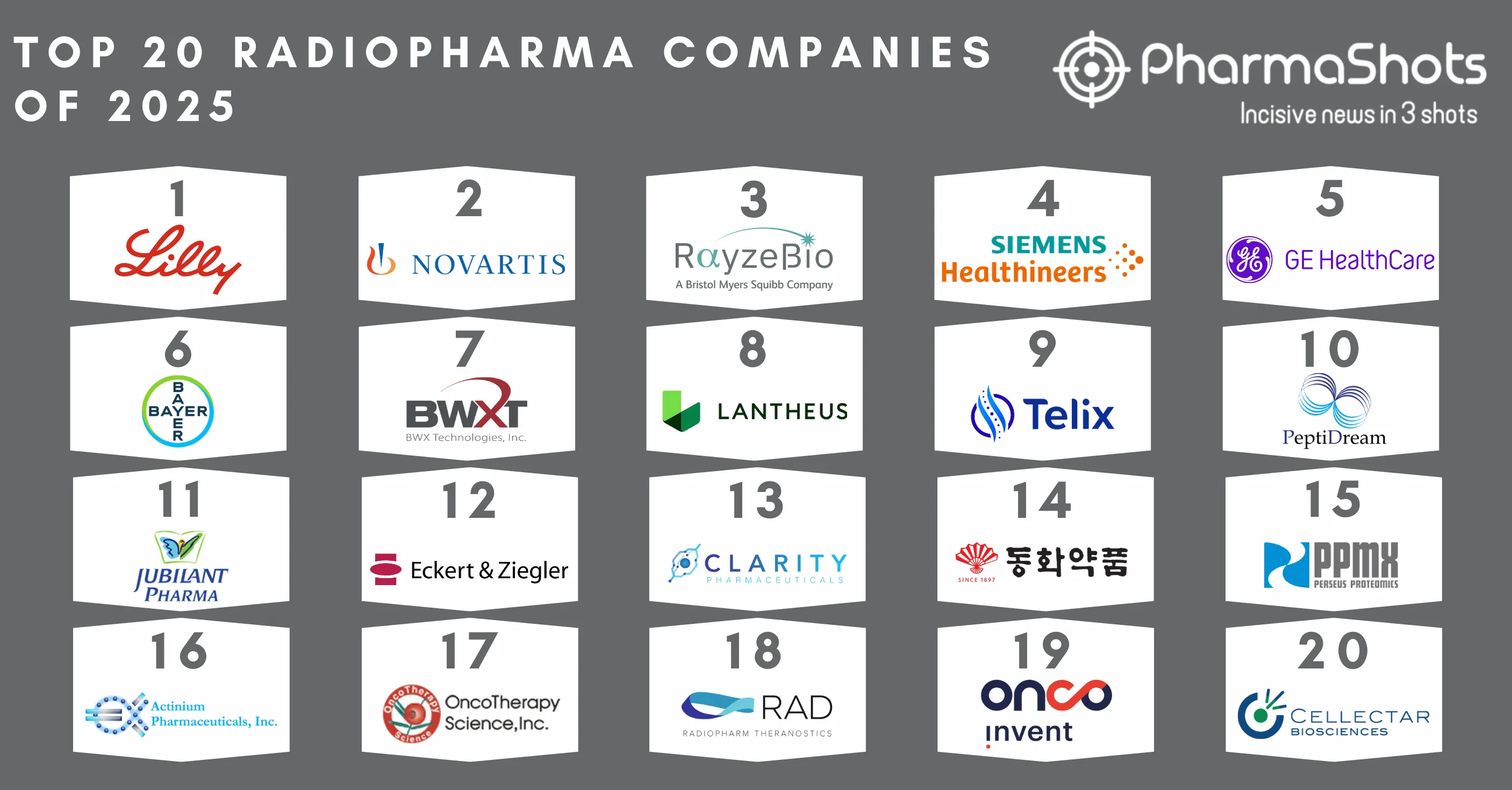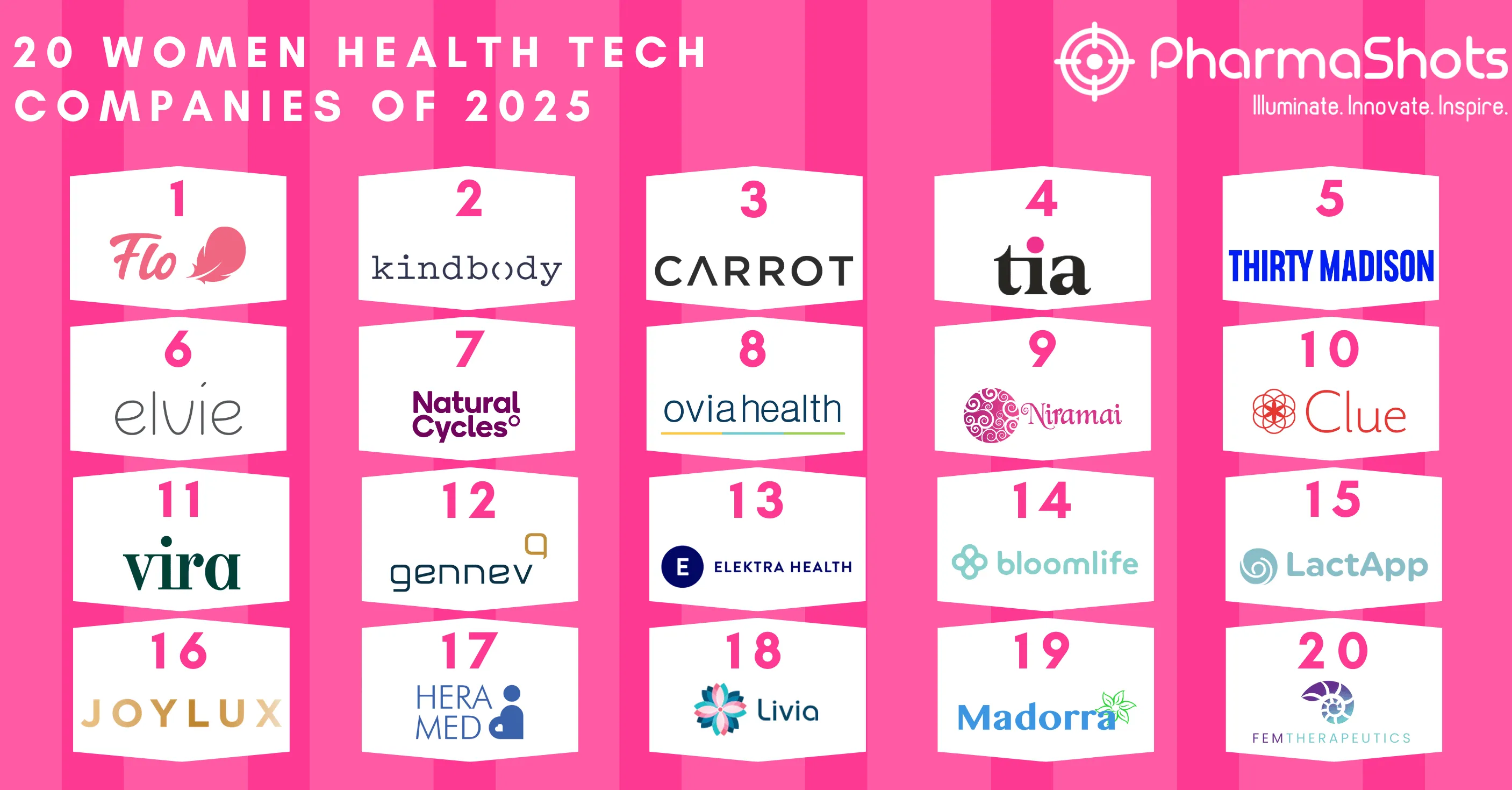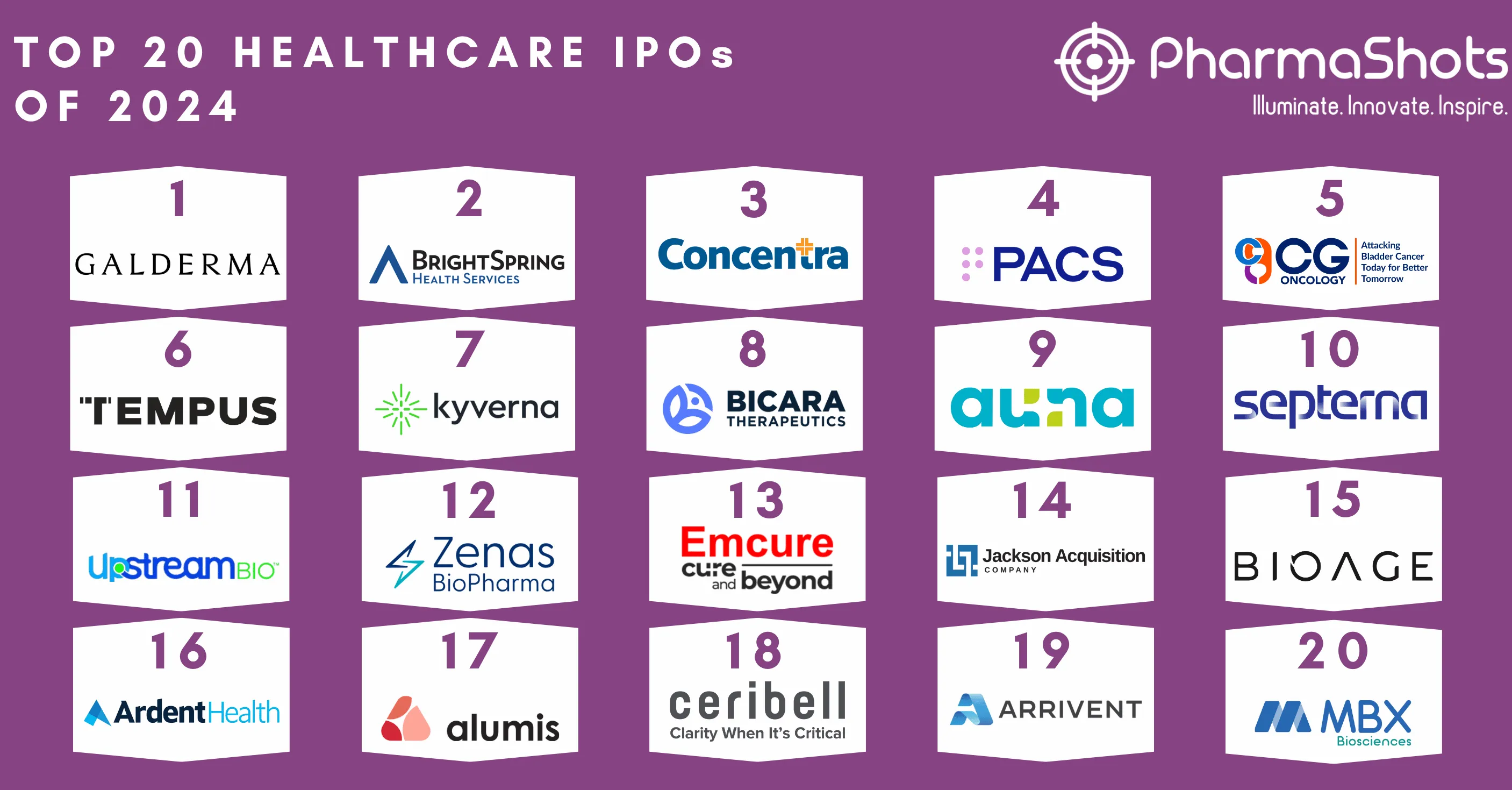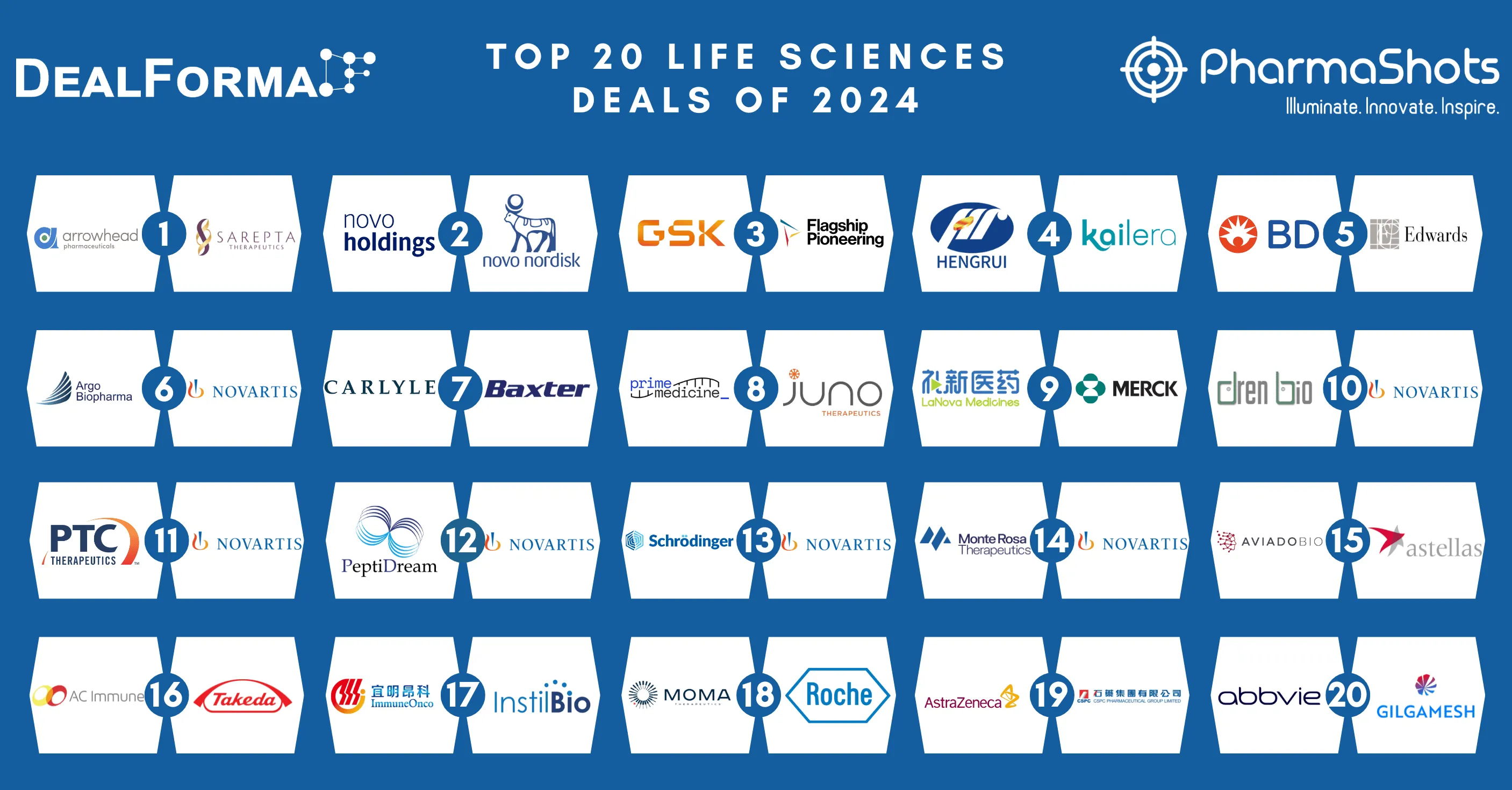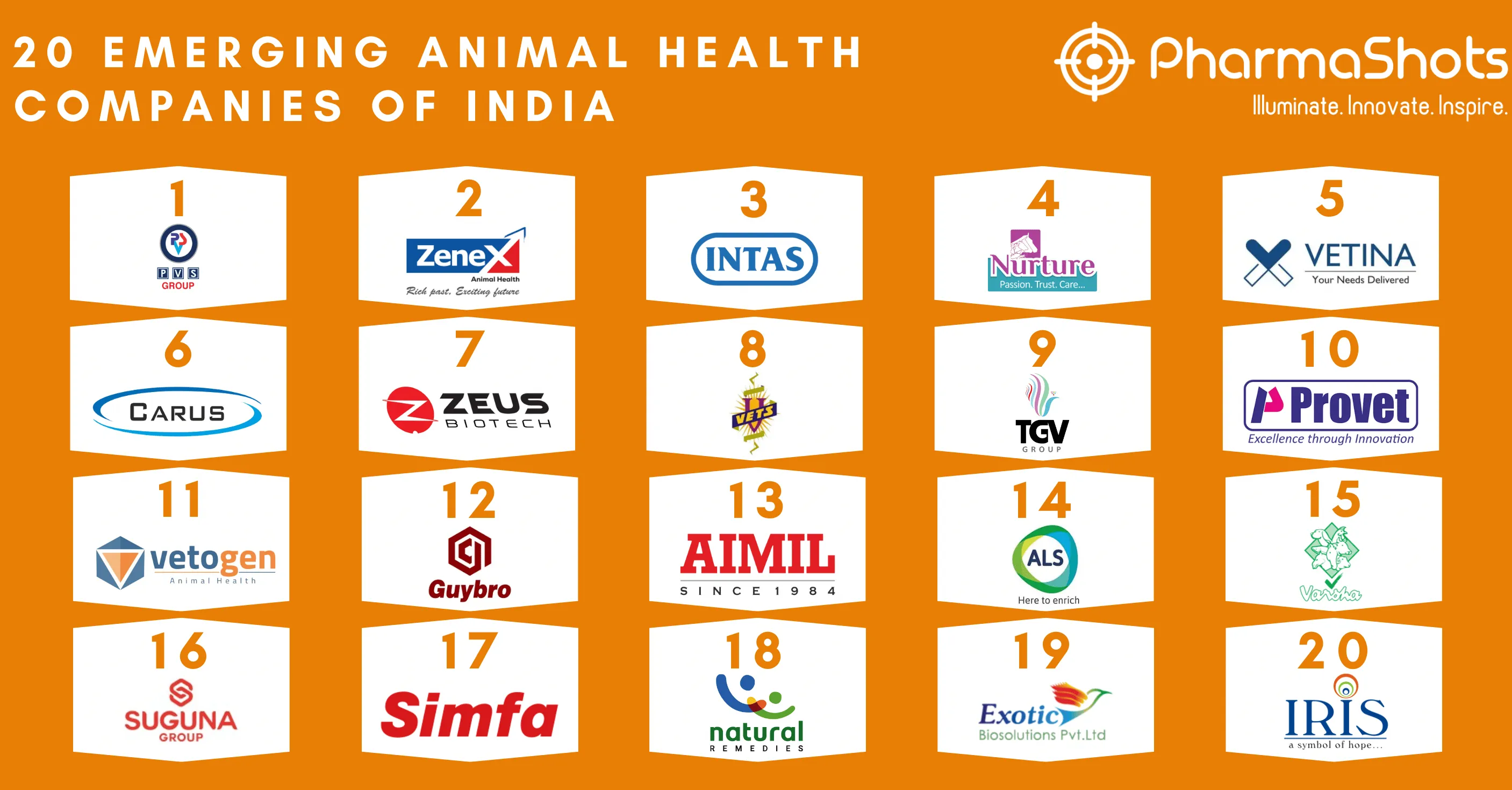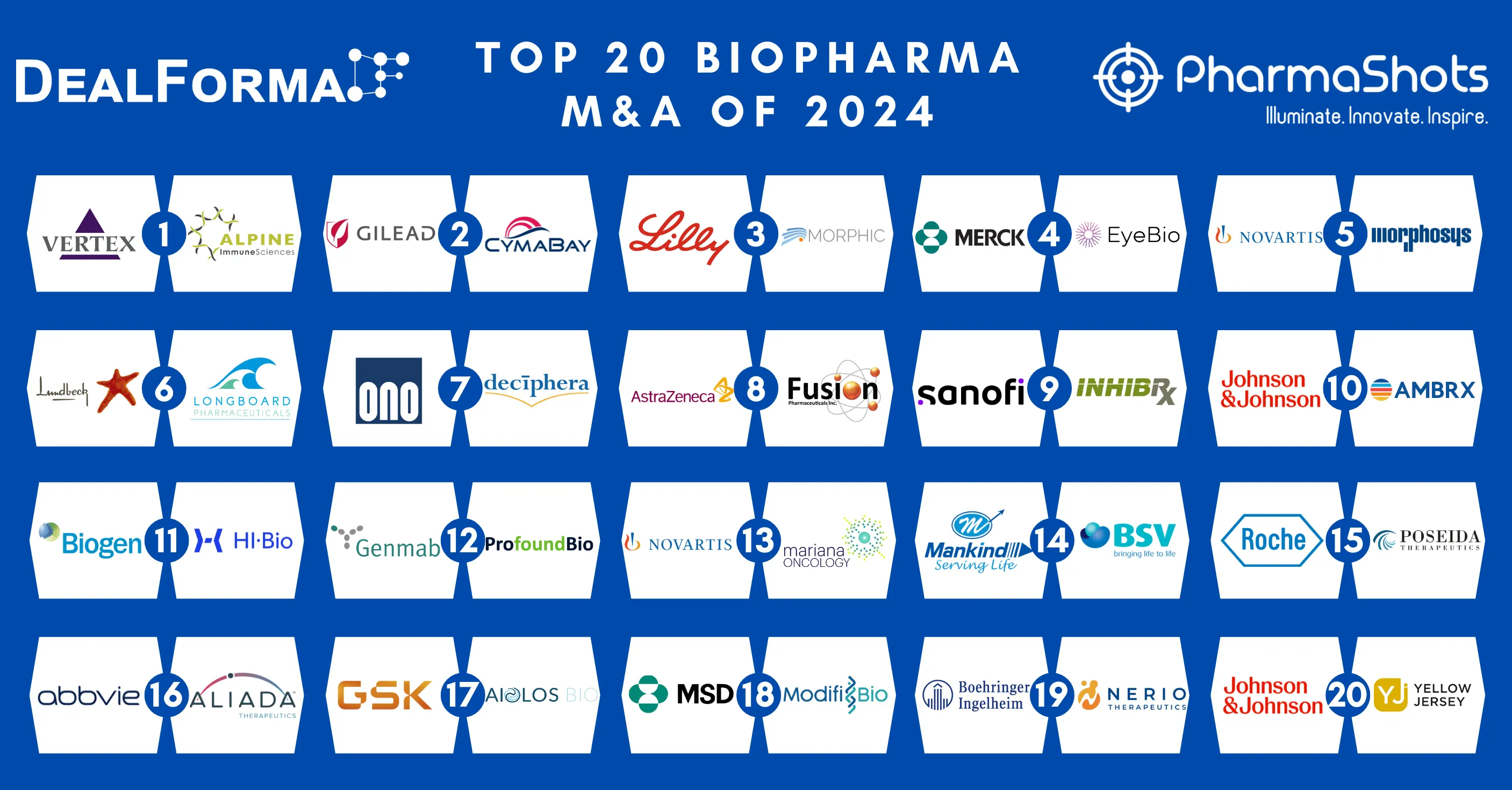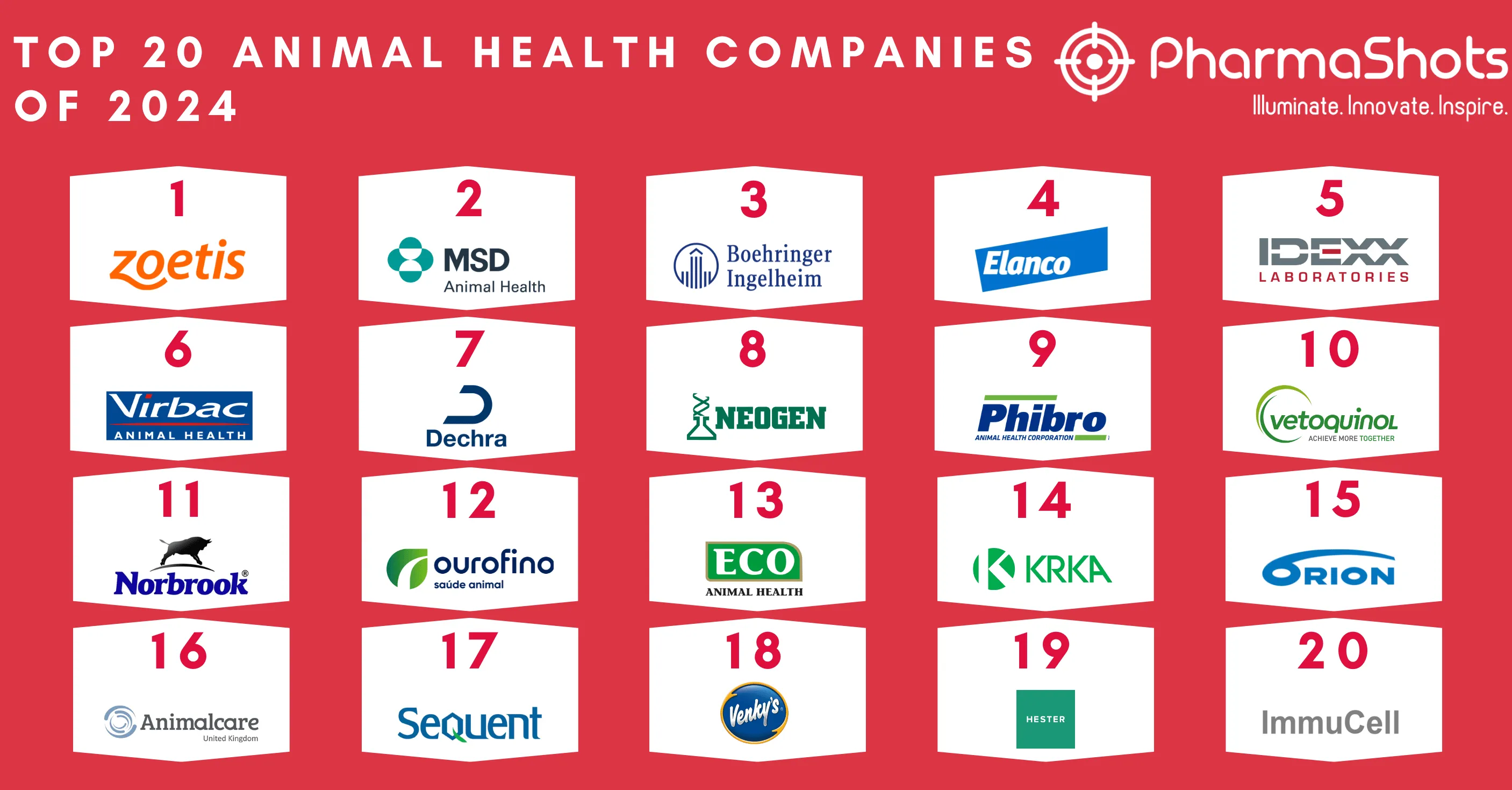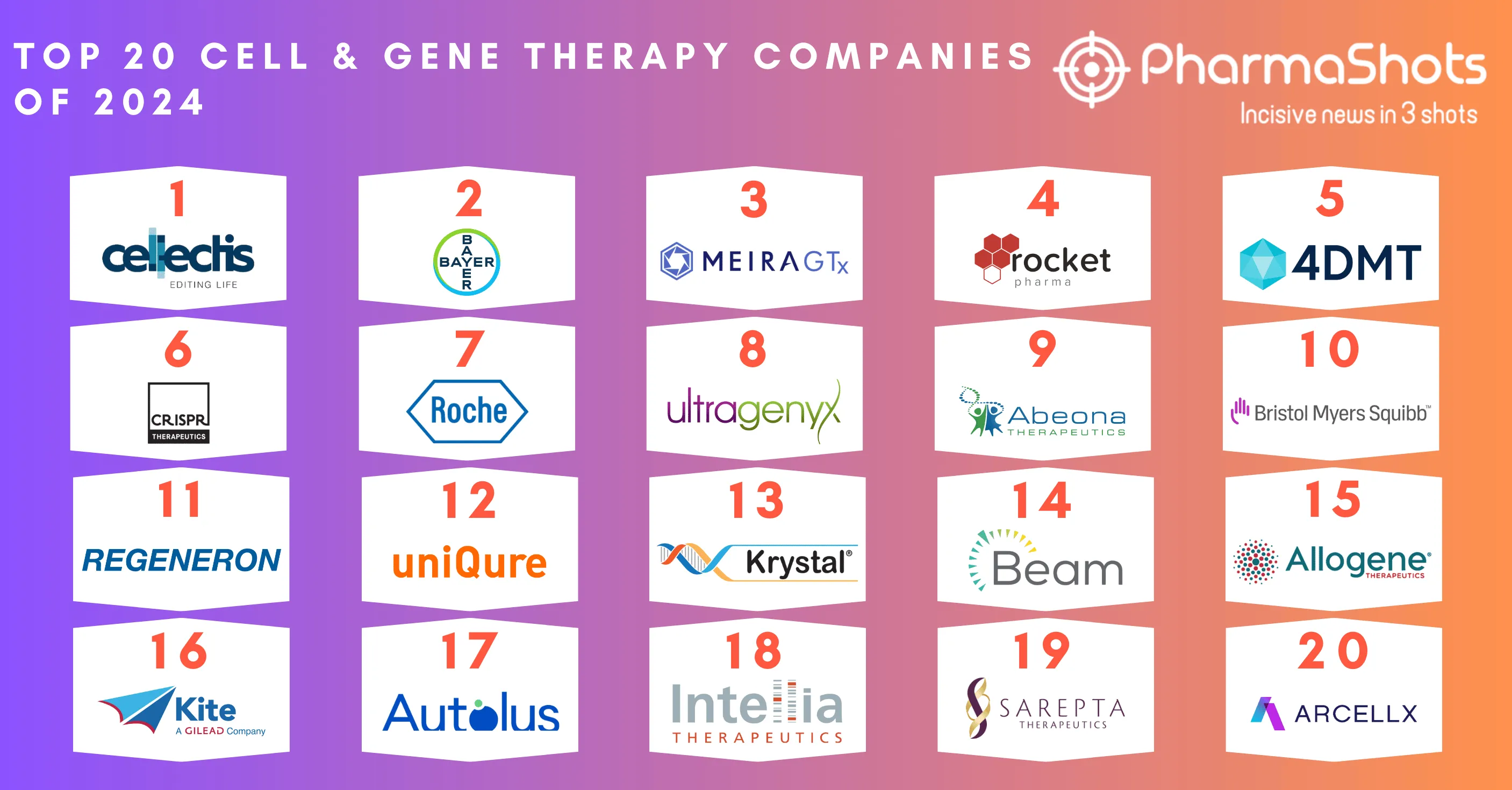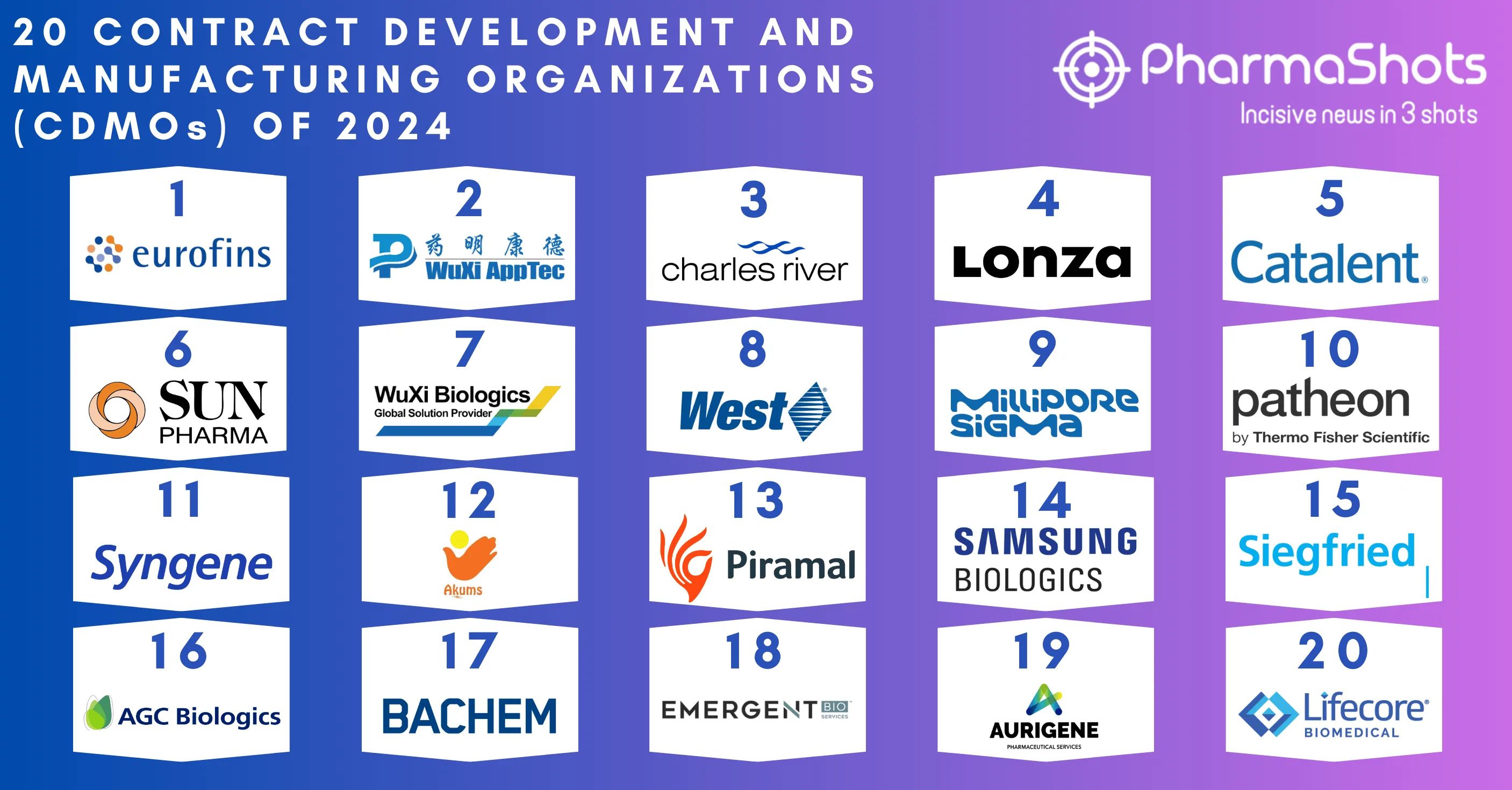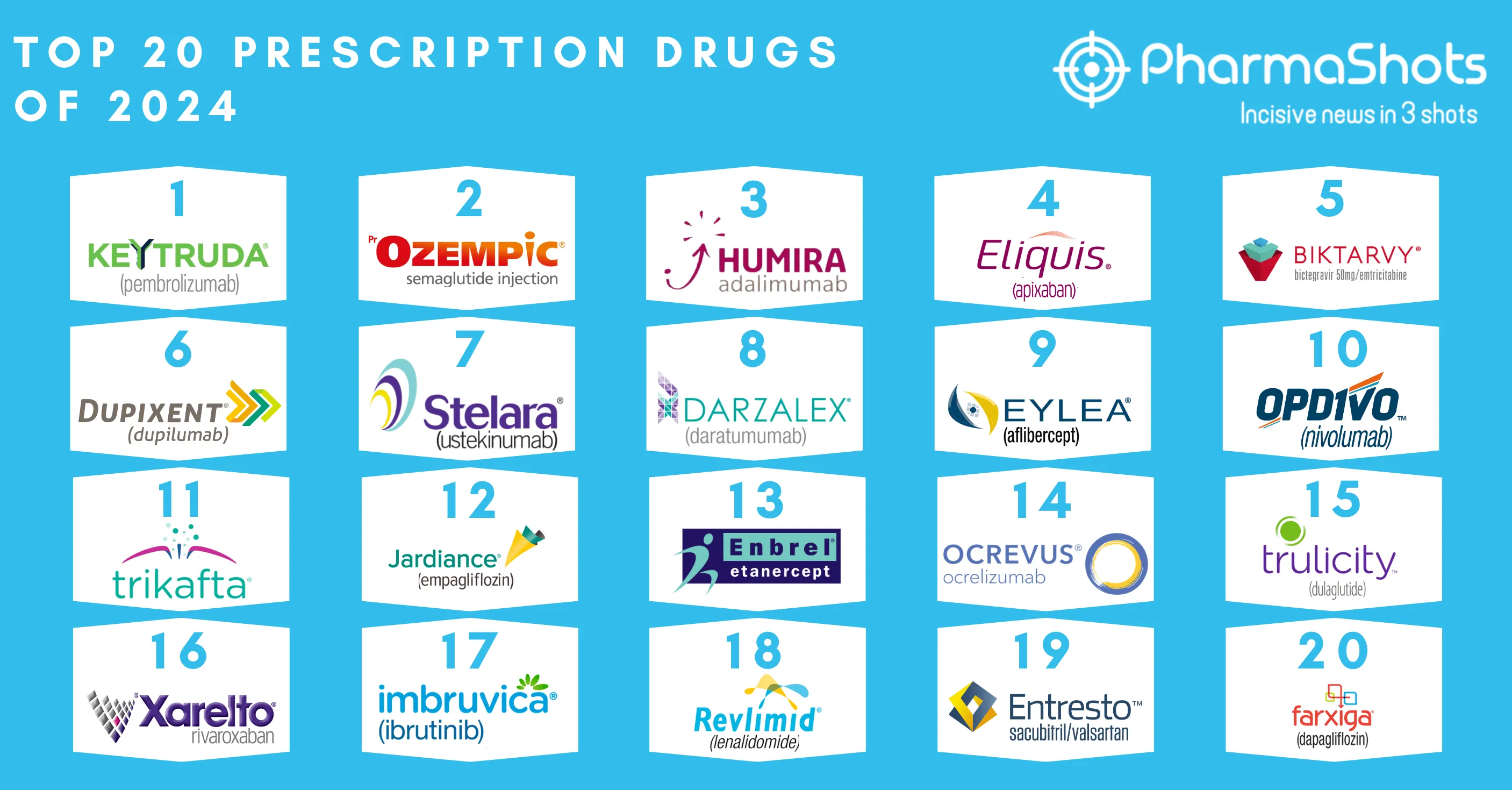
Top 20 Monoclonal Antibodies Based on 2022 Total Revenue
Shots:
- Monoclonal antibodies are transforming therapeutics through their highly efficient targeting mechanisms. There is a wide range of uses for monoclonal antibodies, including diagnosis, therapy, and research
- In 2021, the monoclonal antibody therapy market size was valued at $178.5B and is envisioned to reach $451.89B by 2028, displaying a CAGR of 14.1%. Humira was the top performing mAb in the year 2022 with total sales of $21.24B followed by Keytruda and Stelara with sales of $20.94B and $9.72B respectively
- PharmaShots presents a concise yet informative report on the Top 20 Monoclonal Antibodies based on 2022 total revenue

Proprietary Name: Tremfya
Non-Proprietary Name: Guselkumab
Company: Janssen Pharmaceuticals
First Approved: US (Jul 13, 2017), EU (Nov 10, 2017)
Total Revenue: $2.66B
Indications Approved: Plaque Psoriasis and Psoriatic Arthritis
- Tremfya is administered as a 100 mg subcutaneous injection every eight weeks, except the second dose given four weeks after the first to treat moderate to severe plaque psoriasis, and psoriatic arthritis in adults
- Tremfya inhibits a natural substance in the body called interleukin-23, which induces inflammation and edema
- In 2022, Tremfya generated 25.43% more revenue as compared to 2021. In Mar’22, Janssen initiated first-of-its-kind clinical study to study the efficacy and safety of Tremfya in people of color with moderate to severe plaque psoriasis

Proprietary Name: Imfinzi
Non-Proprietary Name: Durvalumab
Company: AstraZeneca
First Approved: US (May 01, 2017), EU (Sep 21, 2018)
Total Revenue: $2.78B
Indications Approved: Non-Small Cell Lung Cancer, Extensive-Stage Small Cell Lung Cancer, Locally Advanced or Metastatic Biliary Tract Cancer, Unresectable Hepatocellular Carcinoma
- Administered through an IV injection, Imfinzi is prescribed to treat non-small cell lung cancer, extensive-stage small cell lung cancer, locally advanced or metastatic biliary tract cancer, unresectable hepatocellular carcinoma
- Imfinzi attaches to the protein PD-L1 i.e. located on the surface of cancer cells. After attaching it enhances the immune system's capacity to target cancer cells by binding to PD-L1 and blocking its effects, thereby slowing disease progression
- In 2022, Imfinzi’s revenue increased by 15.42% as compared to 2021. In Dec’22, Japan’s MHLW approved Imfinzi + Imjudo for advanced liver and non-small cell lung cancers, while Imfinzi is approved for unresectable biliary tract and liver cancer

Proprietary Name: Xevudy
Non-Proprietary Name: Sotrovimab
Company: GSK
First Approved: US (N/A), EU (Dec 17, 2021)
Total Revenue: $2.79B
Indications Approved: COVID-19
- Xevudy is a SARS-CoV-2 neutralizing monoclonal antibody that functions by binding to an epitope on SARS-CoV-2 shared with SARS-CoV-1, the SARS-Causing virus. The binding of the antibody indicates that the epitope is highly conserved, which makes it more difficult for resistance to develop
- Sotrovimab is developed to have an extended half-life and reach high concentrations in the lungs for maximum penetration into SARS-CoV-2-affected airway tissues. GSK develops Xevudy in collaboration with Vir Biotechnology
- In 2022, the sales of Xevudy increased by 115.48% as compared to 2021. In Feb’22, GSK reported its agreement with the Irish Government to supply Xevudy, developed in partnership with Vir Biotechnology, against COVID-19

Proprietary Name: Actemra (US), RoActemra (EU)
Non-Proprietary Name: Tocilizumab
Company: Roche
First Approved: US (Jan 8, 2010), EU (Jan 16, 2009)
Total Revenue: $2.92M
Indications Approved: Rheumatoid Arthritis, Giant Cell Arteritis, Systemic Sclerosis-Associated Interstitial Lung Disease, Polyarticular Juvenile Idiopathic Arthritis, Systemic Juvenile Idiopathic Arthritis, Cytokine Release Syndrome, COVID-19
- A humanized monoclonal antibody, Actemra is an approved interleukin-6 (IL-6) receptor inhibitor indicated in the form of an IV injection. Actemra is prescribed to treat Rheumatoid Arthritis, Giant Cell Arteritis, Systemic Sclerosis-Associated Interstitial Lung Disease, Polyarticular Juvenile Idiopathic Arthritis, etc.
- In the US, it is approved by the name Actemra while in the EU, it goes by the name RoActemra. It binds to both soluble and membrane-bound IL-6 receptors and inhibits IL-6-mediated signaling through these receptors
- Actemra’s 2022 sales dropped by 25.21% as compared to 2021. In Dec’22, the US FDA approved Roche’s Actemra for the treatment of hospitalized adults with COVID-19.1

Proprietary Name: Avastin
Non-Proprietary Name: Bevacizumab
Company: Roche
First Approved: US (Feb 26, 2004), EU (Jan 12, 2005)
Total Revenue: $3.35B
Indications Approved: Metastatic Colorectal Cancer, Non-Squamous Non-Small Cell Lung Cancer, Recurrent Glioblastoma, Metastatic Renal Cell Carcinoma, Metastatic Cervical Cancer, Hepatocellular Carcinoma, Epithelial Ovarian, Fallopian Tube, or Primary Peritoneal Cancer
- Avastin is a recombinant humanized monoclonal IgG1 antibody prescribed, in the form of an IV injection
- It is approved to treat Colorectal Cancer, Non-Small Cell Lung Cancer, Glioblastoma, Cervical Cancer, etc. Avastin binds to VEGF and prevents the interaction of VEGF with its receptors Flt-1 and KDR on the surface of endothelial cells
- The interaction of VEGF with its receptors leads to endothelial cell proliferation and new blood vessel formation in in vitro models of angiogenesis. In 2022, Avastin’s total revenue rose by 46.01% as compared to 2021.

Proprietary Name: Prolia
Non-Proprietary Name: Denosumab
Company: Amgen
First Approved: US (June 2010), EU (Jun 26, 2010)
Total Revenue: $3.63B
Indications Approved: Breast Cancer, Postmenopausal, Glucocorticoid-Induced Osteoporosis
- Prolia is a RANK ligand (RANKL) inhibitor prescribed in the form of a subcutaneous injection to treat Breast Cancer, Postmenopausal, and Glucocorticoid-Induced Osteoporosis
- Prolia binds to RANKL and prevents it from activating its receptor RANK on the surface of osteoclasts and their precursors. Prevention of the RANKL/RANK interaction inhibits osteoclast formation, function, and survival, thereby decreasing bone resorption and increasing bone mass and strength in both cortical and trabecular bone
- In 2022, Prolia’s 2022 revenue increased by 11.69% vs. 2021

Proprietary Name: Soliris
Non-Proprietary Name: Eculizumab
Company: Alexion (AstraZeneca AB)
First Approved: US (March 16, 2007), EU (June 20, 2007)
Total Revenue: $3.76B
Indications Approved: Paroxysmal Nocturnal Hemoglobinuria and Atypical Hemolytic Uremic Syndrome
- Soliris is a monoclonal antibody, administered as an IV injection. Soliris is prescribed to treat Paroxysmal Nocturnal Hemoglobinuria and Atypical Hemolytic Uremic Syndrome
- It functions by specifically binding to the complement protein C5 with high affinity, thereby inhibiting its cleavage to C5a and C5b and preventing the generation of the terminal complement complex C5b-9
- In 2022, Soliris’ revenue boosted by 100.74% as compared to 2021. In Nov’22, AstraZeneca reported the availability of its rare disease therapy, Soliris, across China for the treatment Of Paroxysmal Nocturnal Haemoglobinuria (PNH) and Atypical Haemolytic Uraemic Syndrome (aHUS) in adults and children

Proprietary Name: Tecentriq
Non-Proprietary Name: Atezolizumab
Company: Roche
First Approved: US (May 18, 2016), EU (Sep 21, 2017)
Total Revenue: $3.76B
Indications Approved: Non-Small Cell Lung Cancer, Small Cell Lung Cancer, Hepatocellular Carcinoma, Melanoma, Alveolar Soft Part Sarcoma
- Tecentriq is a PD-L1 blocking antibody approved in the form of an IV injection for the treatment of Non-Small Cell Lung Cancer, Small Cell Lung Cancer, Hepatocellular Carcinoma, Melanoma, and Alveolar Soft Part Carcinoma
- Tecentriq is a monoclonal antibody that binds to PD L1 and blocks its interactions with both PD 1 and B7.1 receptors
- In 2022, the total sales of Tecentriq increased by 3.47% as compared to 2021. In Jun’22, Roche received the EC’s approval for Tecentriq to treat patients with early-stage Non-Small Cell Lung Cancer

Proprietary Name: Hemlibra
Non-Proprietary Name: Emicizumab
Company: Roche
First Approved: US (Nov 16, 2017), EU (Feb 23, 2018)
Total Revenue: $4.13B
Indications Approved: Hemophilia A (Congenital Factor VIII Deficiency)
- Hemlibra is a bispecific factor IXa- and factor X-directed antibody. It is approved in the form of an IV injection to prevent and reduce the frequency of bleeding episodes in patients with Hemophilia A (Congenital Factor VIII Deficiency) with or without factor VIII inhibitors
- Hemlibra bridges activated factor IX and factor X to restore the function of missing activated factor VIII required for effective hemostasis
- Hemlibra’s 2022 net sales rose by 24.78% as compared to 2021. In Jun’22 Chugai Pharmaceutical received the MHLW’s approval for Hemlibra to prevent or lower the frequency of bleeding in patients with hemophilia A

Proprietary Name: Perjeta
Non-Proprietary Name: Pertuzumab
Company: Roche
First Approved: US (Jun 08, 2012), EU (Mar 04, 2013)
Total Revenue: $4.42B
Indications Approved: HER2-positive Metastatic Breast Cancer and Inflammatory Disorders
- A humanized monoclonal antibody, Perjeta, is approved in the form of an IV injection to treat HER2-Positive Metastatic Breast Cancer and Inflammatory Disorders
- Perjeta functions by targeting the extracellular dimerization domain (Subdomain II) of the HER2 protein and thereby blocks ligand-dependent heterodimerization of HER2 and other HER family members, including EGFR, HER2, and HER4
- In 2022, Perjeta’s total sales increased by 1.93% vs. 2021. In Jul’22, Roche presented the eight-year data from the P-III (APHINITY) clinical trial evaluating Perjeta for the treatment of HER2-positive early Breast Cancer at ESMO 2022

Proprietary Name: Cosentyx
Non-Proprietary Name: Secukinumab
Company: Novartis
First Approved: US (Jan 21, 2015), EU (Jan 15, 2015)
Total Revenue: $4.79B
Indications Approved: Plaque Psoriasis, Psoriatic Arthritis, Ankylosing Spondylitis, Non-Radiographic Axial Spondyloarthritis, Enthesitis-Related Arthritis
- A selective interleukin-17A (IL-17A) inhibitor, Cosentyx, is prescribed to treat Plaque Psoriasis, Ankylosing Spondylitis, Psoriatic Arthritis, Non-Radiographic Axial Spondyloarthritis, and Enthesitis-Related Arthritis.
- Cosentyx is a human IgG1 monoclonal antibody approved in the form of an IV injection. It functions by selectively binding to the IL-17A cytokine and thereby inhibiting its interaction with the IL-17 receptor. Cosentyx inhibits the release of proinflammatory cytokines and chemokines.
- In 2022, the revenue of Cosentyx went up by 1.48% vs 2021. In Jun’22, Novartis’ Consentyx received expanded approvals by the EC for the treatment Of Juvenile Idiopathic Arthritis (JIA) categories of Enthesitis-Related Arthritis (ERA) and Juvenile Psoriatic Arthritis (JPsA) in patients 6 years and older

Proprietary Name: Skyrizi
Non-Proprietary Name: Risankizumab
Company: AbbVie
First Approved: US (Apr 23, 2019), EU (Apr 26, 2019)
Total Revenue: $5.16B
Indications Approved: Plaque Psoriasis, Psoriatic Arthritis, Crohn's Disease
- Skyrizi is an interleukin-23 (IL-23) inhibitor that selectively blocks IL-23 by binding it to its p19 subunit. IL-23 is a naturally occurring cytokine, involved in inflammatory and immune responses.
- Administered by an IV injection, it is approved to treat Plaque Psoriasis, Psoriatic Arthritis, and Crohn’s Disease.
- In 2022, Skyrizi’s total sales boosted by 75.74% as compared to 2021. In Jun’22, AbbVie’s Skyrizi received the US FDA’s approval for the treatment of severely active Crohn’s Disease

Proprietary Name: Entyvio
Non-Proprietary Name: Vedolizumab
Company: Takeda
First Approved: US (May 20, 2014), EU (May 22, 2014)
Total Revenue: $5.29B
Indications Approved: Ulcerative Colitis, Crohn’s Disease
- An integrin receptor antagonist, Entyvio is approved in the form of an IV injection for the treatment of Crohn’s Disease and Ulcerative Colitis.
- Vedolizumab is a humanized monoclonal antibody that functions by specifically binding to the α4β7 integrin and thereby blocking the interaction of α4β7 integrin with mucosal addressin cell adhesion molecule-1 (MAdCAM-1) and inhibiting the migration of memory T-lymphocytes across the endothelium into inflamed gastrointestinal parenchymal tissue.
- Entyvio’s 2022 revenue increased by 23.12% as compared to 2021

Proprietary Name: Ocrevus
Non-Proprietary Name: Ocrelizumab
Company: Roche
First Approved: US (Mar 28, 2017), EU (Jan 08, 2018)
Total Revenue: $6.53B
Indications Approved: Multiple Sclerosis
- A humanized monoclonal antibody, Ocrevus, is developed to target CD20-positive B cells, an immune cell type believed to have a significant contribution to myelin and axonal damage.
- Ocrevus is approved in the form of an IV injection to treat both relapsing and primary progressive forms of multiple sclerosis. Ocrevus supposedly functions by triggering antibody-dependent cellular cytolysis and complement-mediated lysis.
- In 2022, the total sales of Ocrevus went up by 17.78% as compared to 2021. In Jul’22, Roche reported positive results from the P-III (OCARINA II) clinical trial evaluating Ocrevus in patients with Multiple Sclerosis.

Proprietary Name: Darzalex
Non-Proprietary Name: Daratumumab
Company: Janssen Pharmaceuticals
First Approved: US (Nov 16, 2015), EU (May 20, 2016)
Total Revenue: $7.98B
Indications Approved: Multiple Myeloma
- Darzalex is a human anti-CD38 monoclonal antibody developed by Janssen Pharmaceuticals. It is a combination of daratumumab, a CD38-directed cytolytic antibody, and hyaluronidase, an endoglycosidase.
- Administered as an IV infusion, it is indicated to treat Multiple Myeloma. Daratumumab binds to CD38 and thereby causes cells apoptosis through antibody-dependent cellular cytotoxicity, complement-dependent toxicity, inhibition of mitochondrial transfer, or antibody-dependent cellular phagocytosis.
- Darzalex’s 2022 revenue rose by 32.44% as compared to 2021. In Dec’22, Janssen reported results from the P-III (MAIA) clinical trial evaluating Darzalex in combination with lenalidomide and dexamethasone in patients with Multiple Myeloma

Proprietary Name: Opdivo
Non-Proprietary Name: Nivolumab
Company: Bristol-Myers Squibb
First Approved: US (Dec 22, 2014), EU (Jun 19, 2015)
Total Revenue: $8.25B
Indications Approved: Melanoma, Non-Small Cell Lung Cancer, Malignant Pleural Mesothelioma, Renal Cell Carcinoma, Classical Hodgkin Lymphoma, Squamous Cell Carcinoma of the Head and Neck, Urothelial Carcinoma, Colorectal Cancer, Hepatocellular Carcinoma, Esophageal CancerGastric Cancer, Gastroesophageal Junction Cancer, and Esophageal Adenocarcinoma
- A PD-1 blocking antibody, Opdivo is approved to treat Melanoma, Non-Small Cell Lung Cancer, Malignant Pleural Mesothelioma, Renal Cell Carcinoma, Classical Hodgkin Lymphoma, Head and Neck Cancer, Urothelial Carcinoma, etc.
- Prescribed as an IV subcutaneous injection, this PD-1 immune checkpoint inhibitor is designed to control the body’s immune system to help restore the anti-tumor immune response. In 2022, Opdivo’s total sales increased by 9.65% as compared to 2021
- In Apr’2022, BMS received the US FDA’s approval for Opdivo with Chemotherapy as a neoadjuvant treatment for Non-Small Cell Lung Cancer

Proprietary Name: Dupixent
Non-Proprietary Name: Dupilumab
Company: Regeneron Pharmaceuticals
First Approved: US (Mar 28, 2017), EU (Sep 27, 2017)
Total Revenue: $8.9B
Indications Approved: Atopic Dermatitis, Asthma, Chronic Rhinosinusitis with Nasal Polyposis, Eosinophilic Esophagitis, Prurigo Nodularis
- A monoclonal antibody, Dupixent, is prescribed as a subcutaneous injection to treat multiple indications, including Atopic Dermatitis, Asthma, Eosinophilic Esophagitis, etc.
- Dupixent is delivered as a single-dose pre-filled pen along with a single-dose pre-filled syringe. Dupixent functions by inhibiting the signaling of the IL-4 and IL-13 pathways.
- Dupixent’s revenue in 2022 increased by 49.05% as compared to 2021. In May’22, the US FDA approved Regeneron’s Dupixent to treat adults and children (aged ≥12) with Eosinophilic Esophagitis

Proprietary Name: Stelara
Non-Proprietary Name: Ustekinumab
Company: Janssen Pharmaceutical
First Approved: US (Sep 25, 2009), EU (Jan 15, 2009)
Total Revenue: $9.72B
Indications Approved: Plaque Psoriasis, Crohn’s Disease, Psoriatic Arthritis (PsA), Ulcerative colitis
- Stelara is a human interleukin-12 (IL-12) and interleukin-23 (IL-23) that selectively inhibits the IL-12 and IL-23 pathways[SC1] . Administered by an IV injection for subcutaneous use, Stelara is prescribed to treat Plaque Psoriasis, Active Psoriatic Arthritis, Crohn’s Disease, and Ulcerative Colitis.
- Janssen initiated a patient support program by the name of STELARA withME to provide patients with information on insurance coverage, potential out-of-pocket costs, and treatment support.
- As compared to 2021, Stelara’s 2022 revenue increased by 6.45%. In Aug’22, Janssen Pharmaceutical received the US FDA approval for Stelara to treat pediatric patients with Active Psoriatic Arthritis.

Proprietary Name: Keytruda
Non-Proprietary Name: Pembrolizumab
Company: Merck & Co.
First Approved: US (Sep 04, 2014), EU (Jul 15, 2015)
Total Revenue: $20.94B
Indications Approved: Melanoma, Non-Small Cell Lung Cancer, Head and Neck Squamous Cell Cancer, Classical Hodgkin Lymphoma, Primary Mediastinal Large B-Cell Lymphoma, Urothelial Carcinoma, Gastric Cancer, Esophageal Cancer, Cervical Cancer, Hepatocellular Carcinoma, Merkel Cell Carcinoma, Renal Cell Carcinoma, Endometrial Carcinoma, etc.
- Administered by an IV infusion, Keytruda is a human PD-1 blocking antibody indicated to treat patients with Melanoma, Non-Small Cell Lung Cancer, Head, and Neck Squamous Cell Cancer Classical Hodgkin Lymphoma, etc.
- Keytruda, a humanized monoclonal antibody, acts against these indications by blocking the interaction between PD-1 and its ligands (PD-L1 and PD-L2), which activates T-lymphocytes that may affect both the tumor cells and healthy cells.
- In 2022, Keytruda’s net sales went up by 21.82% as compared to 2021. In Mar’22, Merck’s Keytruda received the US FDA’s approval for MSI-H/dMMR Advanced Endometrial Carcinoma.

Proprietary Name: Humira
Non-Proprietary Name: Adalimumab
Company: AbbVie
First Approved: US (Dec 31, 2002), EU (Sep 8, 2003)
Total Revenue: $21.24B
Indications Approved: Rheumatoid Arthritis, Juvenile Idiopathic Arthritis, Psoriatic Arthritis, Ankylosing Spondylitis, Crohn’s Disease, Ulcerative Colitis, Plaque Psoriasis, Hidradenitis Suppurativa, Uveitis
- Indicated for Rheumatoid Arthritis, Psoriatic Arthritis, Ulcerative Colitis, and Plaque Psoriasis, among others, Humira is a tumor necrosis factor blocker that reduces inflammation by targeting and blocking TNF-α.
- Humira is approved across North America and the European Union. Humira’s 2022 revenue rose by 2.62% in 2022 as compared to 2021.
- With the recent expiration of Humira’s patent in 2023, many of Humira's biosimilars are anticipated to enter the market this year.
Sources:
- Annual reports
- SEC Filings
- Press releases
- Product websites
Currency Conversion: X-Rates (Sep 25th , 2023)
Note:
- All revenues are reported in $B
Related Posts: Top 20 Companies Spending on R&D in 2022
Tags

Shivani was a content writer at PharmaShots. She has a keen interest in recent innovations in the life sciences industry. She was covering news related to Product approvals, clinical trial results, and updates. We can be contacted at connect@pharmashots.com.




